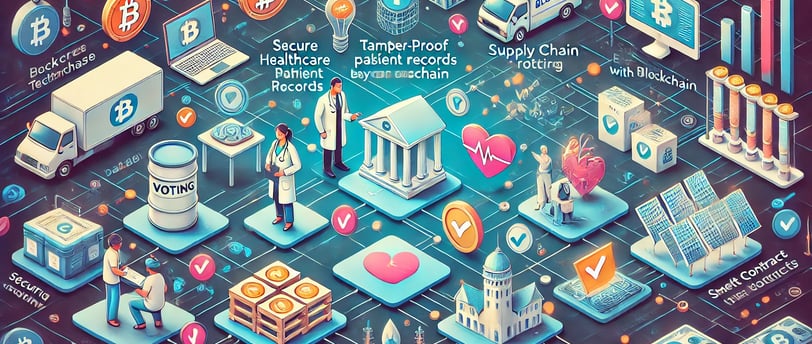Blockchain Beyond Cryptocurrency: Applied Aspects of the Blockchain
Blockchain technology is basically associated with digital money but it is much more than that. Here’s a look at how blockchain is transforming industries through its secure, transparent, and decentralized nature:
1. Supply Chain Management
The skills provided by blockchain are main to allow envisioning and validating the presence and accountability of a good in the offer chain as a result of its ability to supply transparency and –ability. Through an SCM system, it is easy to monitor products from production up to delivery of the goods in a bid to guarantee quality and check on fraud cases.
2. Healthcare
Blockchain brings value to the field of health by making data safe and private as patient records are immutable. This enables draw up of correct diagnosis and treatment plans among different healthcare providers and allows for secure sharing of medical information.
3. Voting Systems
Automated voting systems claim free, unfalterable, and unalterable voting systems through blockchain. Through blockchain technology a record can be made and checked at the same instance to control votes and this way there will be less chances of fraud and people will trust the election results.
4. Real Estate
Smart contracts, which carry out the provisions of a contract automatically once specific conditions have been met, make property transactions easy through the use of blockchain. This cuts the intermediaries out, decreases the cost and time taken to do the transaction besides making records of ownership more open and secure.
5. copyright and trademarks
Blockchain preserves the ownership of intellectual property rights, and offers a safe and verifiable method for licencing digital artefacts. They are able to effectively regulate the utilisation of their piece, market it and check on its utilisation to make sure that they are being paid.
6. Energy Management
Blockchain means that the consumer is not only a consumer but a producer since they are now allowed to sells excess renewable energy to other consumers directly. Thanks to blockchain, energy markets are subsequently decentralized and renewable resources are encouraged in a more efficient way in the energy economy.
7. Identity Verification
Validations performed through block-chain enabled securitized identity-providers complement the need to protect identities from fraud and enable citizens, especially vulnerable groups, to access basic financial services as well as; health and government services free from the necessity of carrying physical documents.
8. Insurance
Of the aspects of the business that blockchain addresses, claims processing is automatically done using smart contracts whereby the claim cannot be processed unless certain conditions are met. This eliminates paperwork, brings down fraud and hastens the process thus, making insurance more efficient and clear.
9. Food Safety
Blockchain tracks back sources of foods and supply chain to ensure they do not compromise the foods. In the cases of a foodborne, illness outbreak, blockchain technology helps in identification of the root cause and better management of recalls thus creating trust for consumers.
Blockchain is promising to deliver disruptive outcomes in several industries, those that would most benefit from transparency, security and decentralization. These use cases demonstrate that blockchain can be a powerful tool for improving operations and increasing trust around the world across industries.


